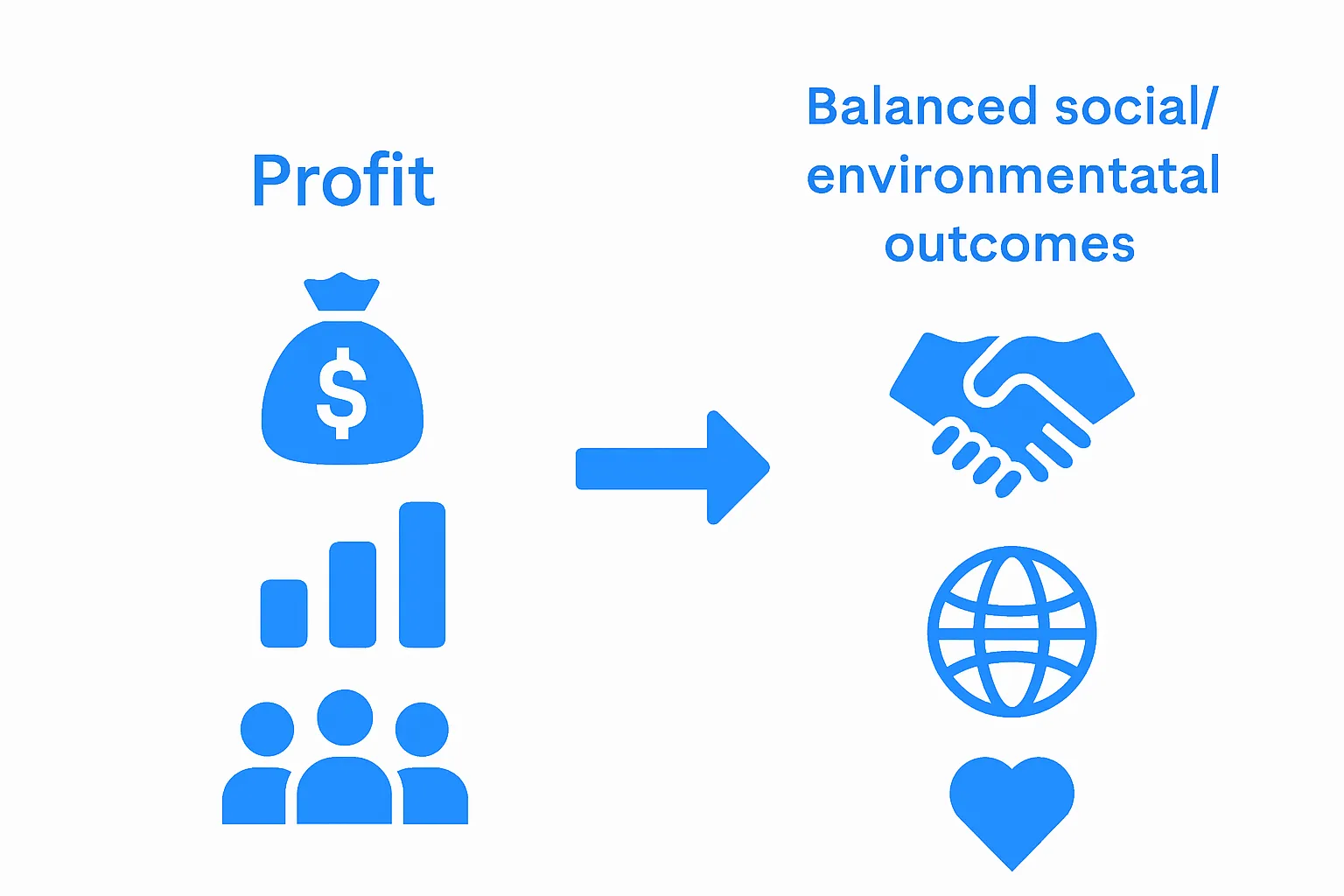Corporate social responsibility is not just a fancy slogan anymore. It has become a driving force behind real business transformation. You might think only large companies benefit from this, but actually companies that embrace social and environmental responsibility regularly outperform their competitors in long-term financial success. The surprise is that profit now follows purpose, changing how businesses win in South Africa and around the world.
Table of Contents
- What Is Corporate Social Responsibility?
- Why Corporate Social Responsibility Matters
- How Corporate Social Responsibility Functions
- Key Concepts In Corporate Social Responsibility
- The Impact Of Corporate Social Responsibility On Businesses
Quick Summary
| Takeaway | Explanation |
|---|---|
| CSR Enhances Long-term Business Success | Companies that prioritize CSR strategies outperform peers in financial performance over time. |
| Embrace Stakeholder Engagement | Engaging with communities and stakeholders creates positive societal impact and drives business value. |
| CSR Drives Innovation and Efficiency | Sustainable practices foster operational efficiency and can lead to innovative solutions that benefit all. |
| Talent Attraction Through CSR Commitment | Firms focused on social responsibility are more appealing to skilled employees, boosting retention and satisfaction. |
| Transform CSR into Core Strategy | Integrating CSR into business models shifts focus from profit solely to societal benefits and sustainable growth. |
What is Corporate Social Responsibility?
Corporate Social Responsibility (CSR) represents a strategic approach where businesses integrate social and environmental considerations into their core operations and stakeholder interactions. According to leading research from Harvard Business Review, CSR goes beyond mere philanthropy and represents a fundamental reimagining of how companies engage with societal challenges.
Understanding the Core Concept
At its essence, corporate social responsibility is about businesses recognizing their broader impact beyond financial performance. Companies adopting CSR commit to operating in economically, socially, and environmentally sustainable ways. This approach acknowledges that organizations have responsibilities that extend far beyond generating profits for shareholders.
Key principles of CSR include:
- Ethical business practices
- Environmental sustainability
- Positive social impact
- Transparent governance
- Stakeholder engagement
Strategic Dimensions of CSR
CSR is not a uniform concept but a multifaceted strategy that varies across industries and organizational contexts. Businesses implement CSR through various mechanisms such as:
- Sustainable supply chain management
- Community development programmes
- Environmental conservation initiatives
- Ethical labour practices
- Philanthropic investments
Modern corporations increasingly view CSR as a critical component of long-term business strategy, recognizing that sustainable practices can drive innovation, enhance brand reputation, and create meaningful societal value. By integrating social responsibility into their core business models, organizations can simultaneously address global challenges while maintaining competitive advantage.
Why Corporate Social Responsibility Matters
Corporate Social Responsibility has transformed from a peripheral business concept to a critical strategic imperative in the modern global economy. Research from McKinsey Global Institute demonstrates that companies prioritizing social and environmental considerations consistently outperform their peers in long-term financial performance and stakeholder perception.
Business Sustainability and Economic Impact
Beyond ethical considerations, CSR represents a profound strategic approach to business resilience and growth. Companies that embed social responsibility into their core operations discover significant competitive advantages.
 These organizations recognize that sustainable practices are not cost centers but investment opportunities that generate substantial returns through enhanced reputation, operational efficiency, and innovative thinking.
These organizations recognize that sustainable practices are not cost centers but investment opportunities that generate substantial returns through enhanced reputation, operational efficiency, and innovative thinking.
Key economic benefits of robust CSR strategies include:
- Reduced operational risks
- Enhanced brand reputation
- Improved talent attraction and retention
- Increased customer loyalty
- Access to new market opportunities
Stakeholder Expectations and Social Transformation
In an increasingly interconnected world, stakeholders demand more than traditional financial metrics. Consumers, investors, employees, and communities now evaluate businesses through a multidimensional lens that considers social and environmental impact. Modern organizations understand that their success is intrinsically linked to their ability to create positive societal value.
Businesses implementing comprehensive CSR strategies effectively address critical global challenges such as climate change, social inequality, and sustainable development. By aligning corporate objectives with broader societal needs, companies can drive meaningful change while maintaining robust economic performance.
The evolution of CSR represents a fundamental shift from viewing businesses as isolated economic entities to recognizing them as integral components of a complex, interdependent global ecosystem.
How Corporate Social Responsibility Functions
According to the United Nations Industrial Development Organization, CSR functions through a strategic and systematic approach to integrating social and environmental considerations into business operations.
Structural Implementation Mechanisms
Corporate Social Responsibility operates through deliberate, structured frameworks that transform organizational philosophy into actionable strategies. Businesses develop comprehensive CSR approaches by establishing dedicated departments, creating specific policies, and embedding social responsibility principles across all operational levels.
Key structural implementation mechanisms include:
- Establishing CSR governance committees
- Developing explicit CSR policies and guidelines
- Creating measurable social and environmental performance targets
- Implementing regular reporting and transparency protocols
- Integrating CSR objectives into strategic planning processes
Practical Application and Engagement Strategies
Effective CSR implementation requires multifaceted engagement strategies that extend beyond traditional corporate boundaries. Organizations engage with various stakeholders including employees, local communities, suppliers, customers, and regulatory bodies to design and execute meaningful social responsibility initiatives.
Typical CSR engagement strategies encompass:
- Community development programmes
- Environmental sustainability projects
- Ethical supply chain management
- Employee volunteer programmes
- Philanthropic investment and strategic donations
The functional approach to CSR transforms social responsibility from a peripheral activity to a core organizational strategy. By systematically integrating social and environmental considerations into decision making processes, businesses can create sustainable value that benefits both the organization and broader societal ecosystem.
Key Concepts in Corporate Social Responsibility
According to the United Nations Development Programme, corporate social responsibility encompasses a comprehensive framework of principles designed to align business practices with broader societal and environmental objectives.
Core Philosophical Foundations
Corporate Social Responsibility is grounded in fundamental principles that transcend traditional business paradigms. These principles represent a holistic approach to organizational management that recognizes businesses as integral components of a complex social ecosystem. The philosophical underpinnings of CSR challenge the narrow view of corporations as solely profit generating entities.
Fundamental philosophical principles include:
- Recognition of stakeholder interconnectedness
- Ethical responsibility beyond legal compliance
- Commitment to sustainable development
- Respect for human rights
- Transparent and accountable governance
Strategic Conceptual Dimensions
Modern CSR is characterized by multidimensional strategic concepts that integrate social, environmental, and economic considerations into core business strategy. These concepts represent a sophisticated approach to understanding organizational impact and responsibility.
Key strategic CSR concepts encompass:
- Stakeholder value creation
- Long term sustainability
- Holistic performance measurement
- Social innovation
- Systemic approach to global challenges
By embracing these comprehensive concepts, organizations transform CSR from a peripheral compliance activity into a fundamental strategic approach that generates value for businesses, communities, and global ecosystems. The evolution of these concepts reflects a profound shift in understanding the role of corporations in addressing complex societal and environmental challenges.
The table below summarises the key philosophical foundations and strategic conceptual dimensions of Corporate Social Responsibility (CSR), clarifying how these principles shape modern business approaches.
| CSR Principle / Concept | Description |
|---|---|
| Recognition of stakeholder interconnectedness | Acknowledges that businesses are part of a broader social ecosystem, impacting various groups. |
| Ethical responsibility beyond legal compliance | Commits organisations to act with integrity, not just follow the law. |
| Commitment to sustainable development | Focuses on long-term growth that conserves social and environmental resources. |
| Transparent and accountable governance | Ensures open communication and responsibility to stakeholders. |
| Stakeholder value creation | Prioritises benefits for all stakeholders, not just shareholders. |
| Holistic performance measurement | Evaluates success using financial, social, and environmental outcomes. |
| Social innovation | Drives change by developing solutions to societal challenges. |
The Impact of Corporate Social Responsibility on Businesses
According to Harvard Business Review research, corporate social responsibility significantly transforms organizational performance, reputation, and long term strategic positioning.
Financial and Competitive Advantages
Corporate Social Responsibility delivers substantial economic benefits that extend far beyond traditional philanthropic activities. Organizations implementing comprehensive CSR strategies experience enhanced financial performance through improved operational efficiency, reduced risks, and increased market opportunities.
Key financial advantages include:
- Enhanced brand value and reputation
- Improved investor attractiveness
- Reduced operational and regulatory risks
- More efficient resource utilization
- Greater operational resilience
Organizational Culture and Talent Dynamics
CSR profoundly influences organizational culture and human capital management. Companies committed to social responsibility attract and retain top talent, particularly among younger generations who prioritize meaningful work and organizational purpose. These strategies create a more engaged, motivated workforce aligned with broader societal goals.
Cultural and talent impacts encompass:
- Higher employee satisfaction and retention
- Improved recruitment of skilled professionals
- Enhanced internal collaboration
- Stronger organizational identity
- Greater workforce diversity and inclusion
By integrating social responsibility into core business strategies, organizations transform from traditional profit centered models to purpose driven enterprises that generate value for multiple stakeholders simultaneously. This holistic approach represents a fundamental reimagining of corporate success in the 21st century.
Below is a table outlining the main financial and cultural impacts that integrating Corporate Social Responsibility (CSR) has on modern businesses in South Africa and globally.
| Impact Area | Key Benefit |
|---|---|
| Enhanced brand value and reputation | Builds greater trust and visibility among stakeholders. |
| Improved investor attractiveness | Draws investors seeking resilient, purpose-driven firms. |
| Reduced operational and regulatory risks | Minimises the chance of non-compliance and costly incidents. |
| Efficient resource utilisation | Streamlines processes to reduce waste and operational costs. |
| Higher employee satisfaction and retention | Encourages loyalty and commitment within the workforce. |
| Greater workforce diversity and inclusion | Fosters a broader range of perspectives and innovation. |

Bring Purpose and Innovation Together With Custom Digital Solutions
You have seen in our article how corporate social responsibility is reshaping business by demanding greater transparency, engagement, and sustainable practices. Yet you may feel unsure how your brand can visibly align with these CSR principles online. Adopting ethical business practices and demonstrating positive social impact is not just about intent. It is also about presenting your values through every digital channel and building trust with your audience.
If you want your website or mobile solution to reflect your commitment to impactful change and responsible growth, you need a trusted digital partner. Discover how your next digital project can clearly express your values and drive sustainable results. Visit CloudFusion’s Web Design and Development Quotation page now. Let us show you how our tailored design, development, and branding services can position you as a leader in purpose-driven business. Take the first step to a stronger, more socially responsible digital presence today at cloudfusion.co.za.
Frequently Asked Questions
What is Corporate Social Responsibility (CSR)?
Corporate Social Responsibility (CSR) is a strategic approach where businesses integrate social and environmental considerations into their core operations and stakeholder interactions, moving beyond traditional profit-making to acknowledge their wider impact on society.
Why is Corporate Social Responsibility important for businesses?
CSR is crucial for businesses as it can lead to enhanced financial performance, improved brand reputation, talent attraction and retention, and reduced operational risks by aligning company objectives with societal needs and expectations.
How can companies implement effective CSR strategies?
Companies can implement effective CSR strategies by establishing dedicated departments, creating CSR policies and guidelines, setting measurable goals, engaging with stakeholders, and integrating social responsibility into their overall business planning and operations.
What are the benefits of integrating CSR into business operations?
Integrating CSR can provide numerous benefits, including enhanced brand value, improved investor attractiveness, reduced risks, better operational efficiency, and a more engaged workforce, ultimately leading to a more resilient and purpose-driven organization.
Recommended
- Understanding Corporate Branding Strategies for Success
- Understanding Creating a Corporate Identity Effectively
- Website Development by Cloudfusion
- Internet Marketing by Cloudfusion
- Understanding Corporate Social Responsibility: A Comprehensive Guide – Mats4U
- blog | siift | Purpose Driven Business: A Simple Guide for Beginners








